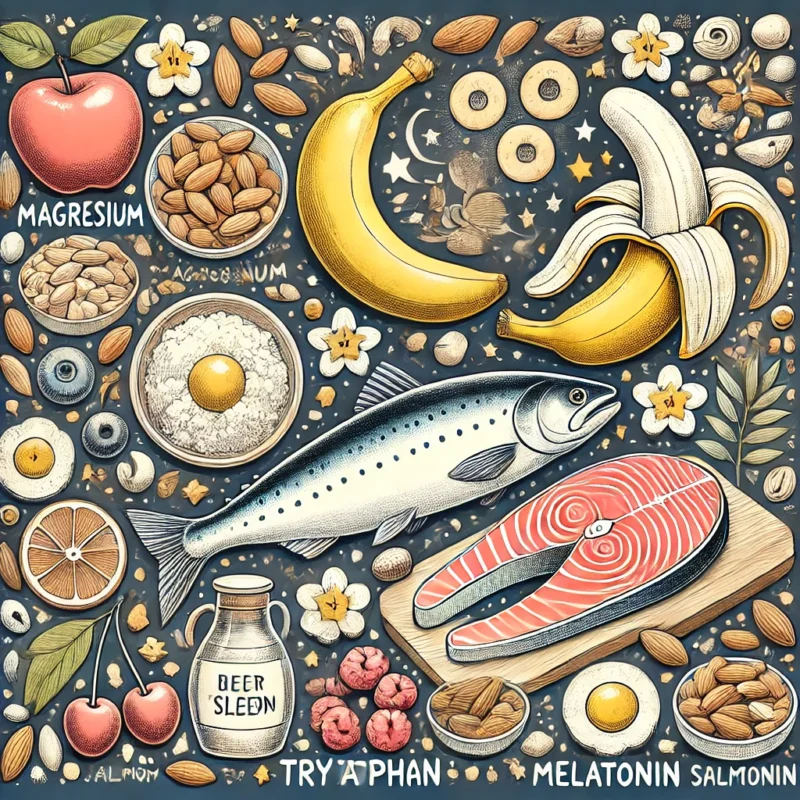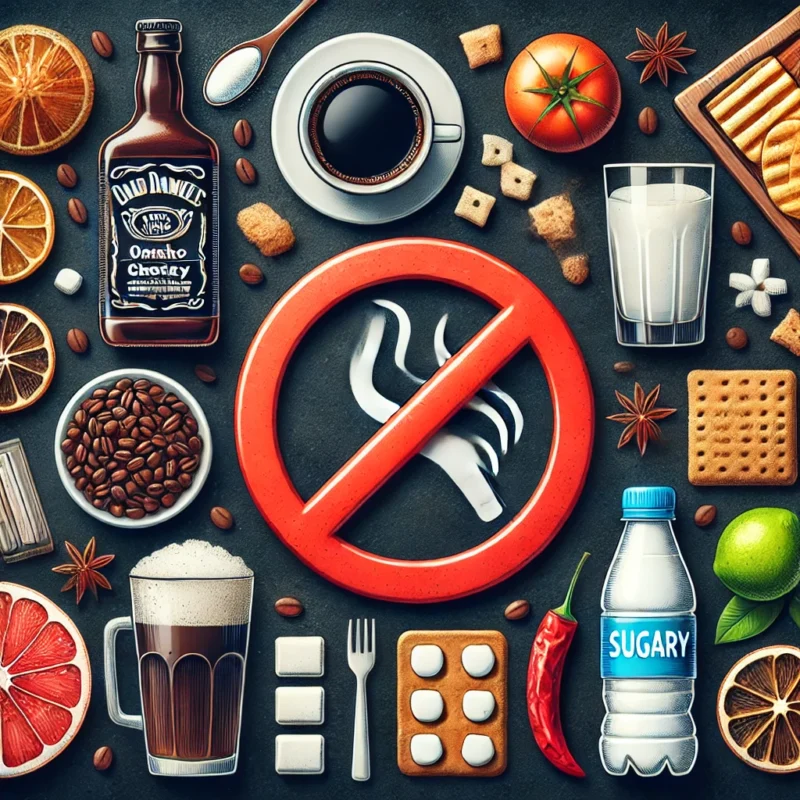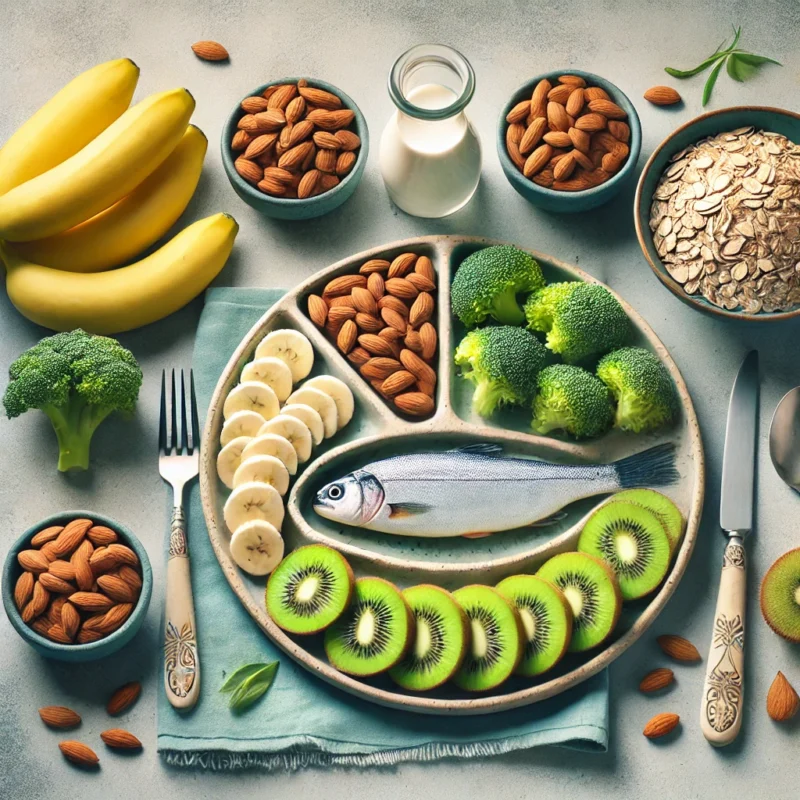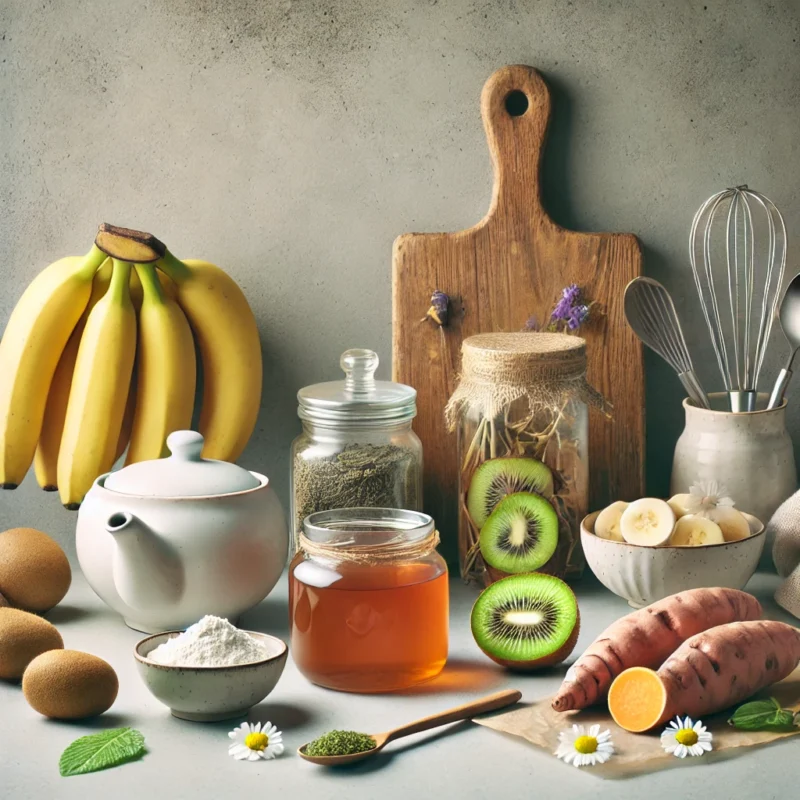Sleep is one of the pillars of good health, alongside nutrition and physical activity. Yet, millions worldwide suffer from poor sleep quality or sleep disorders. While external factors like stress, screen exposure, and irregular schedules are often blamed, many overlook the impact of diet. What you eat and drink throughout the day significantly influences how well you sleep at night.
Certain foods contain sleep-enhancing nutrients that calm the brain, regulate hormones, and even maintain a stable circadian rhythm. Others, if consumed too close to bedtime, can disrupt your rest and make falling asleep difficult. In this comprehensive blog, we’ll delve into the science of sleep-related nutrition, list foods that promote better sleep, and provide practical tips to help you incorporate these into your daily routine.
Table of Contents
The Science of Sleep and Nutrition

How Food Influences Sleep
The relationship between food and sleep involves multiple mechanisms:
- Regulation of Sleep Hormones
Nutrients like tryptophan, magnesium, and melatonin contribute to producing serotonin and melatonin, essential chemicals for initiating and maintaining sleep. - Blood Sugar Stability
Consuming balanced meals with complex carbohydrates and protein helps maintain stable blood sugar levels, preventing energy crashes and nighttime awakenings. - Circadian Rhythm Support
Some foods, like those high in melatonin, actively reinforce the body’s sleep-wake cycle, making it easier to fall asleep and stay asleep. - Stress and Relaxation
Foods high in magnesium, omega-3s, and antioxidants reduce stress hormones, creating a relaxed state conducive to sleep.
Key Sleep-Promoting Nutrients
- Tryptophan
Tryptophan is an amino acid found in protein-rich foods. It serves as a precursor to serotonin, which in turn produces melatonin, the “sleep hormone.” Foods like turkey, eggs, and cheese are excellent sources. - Magnesium
Magnesium relaxes the nervous system and supports deep, restorative sleep. Deficiencies in magnesium are linked to insomnia and restless nights. Leafy greens, nuts, and seeds are magnesium-rich options. - Melatonin
Melatonin is naturally produced by the pineal gland, but consuming melatonin-rich foods like cherries or grapes can boost levels in your bloodstream, promoting sleep readiness. - Vitamin B6
This vitamin is essential for serotonin production and helps improve sleep. Bananas, chicken, and chickpeas are high in vitamin B6. - Calcium
Calcium aids in converting tryptophan into melatonin and supports muscle relaxation. Dairy products, fortified plant-based milks, and almonds are excellent calcium sources. - Omega-3 Fatty Acids
Omega-3s, especially DHA, help regulate sleep by reducing inflammation and supporting serotonin pathways. Fatty fish and flaxseeds are great choices.
Top Foods That Promote Better Sleep

1. Tart Cherries
Tart cherries are one of the few natural sources of melatonin. Studies show that drinking tart cherry juice can improve both the quality and duration of sleep. They also contain antioxidants that reduce inflammation, further promoting relaxation.
How to Consume:
- Eat fresh or dried tart cherries as a snack.
- Drink tart cherry juice 1-2 hours before bed.
2. Bananas
Bananas are rich in magnesium and potassium, two minerals that act as natural muscle relaxants. Additionally, bananas contain vitamin B6 and tryptophan, which aid serotonin and melatonin production.
How to Consume:
- Enjoy a banana with almond butter for a healthy evening snack.
- Add sliced bananas to oatmeal for a soothing bedtime treat.
3. Almonds
Almonds are high in magnesium, a mineral critical for relaxing the body and reducing stress. Just a small handful can improve your chances of achieving deep sleep.
How to Consume:
- Eat raw almonds as a snack.
- Add chopped almonds to your yogurt or cereal.
4. Fatty Fish
Fatty fish like salmon, tuna, and mackerel are rich in omega-3 fatty acids and vitamin D. Both nutrients enhance serotonin production and improve sleep regulation.
How to Consume:
- Grill salmon for dinner and serve with leafy greens and sweet potatoes.
- Incorporate fish into your meals at least twice a week.
5. Kiwi
Kiwi is a powerhouse of antioxidants, including vitamins C and E, as well as serotonin. Studies suggest that consuming two kiwis before bed can significantly improve sleep duration and onset.
How to Consume:
- Slice and eat kiwis as a bedtime snack.
- Blend kiwis into a smoothie with bananas and yogurt.
6. Oatmeal
Oats are rich in melatonin and complex carbohydrates that stimulate serotonin production. They also stabilize blood sugar, helping you sleep more soundly.
How to Consume:
- Make a warm bowl of oatmeal with honey and walnuts before bed.
- Use chamomile tea instead of water to cook oats for added relaxation.
7. Chamomile Tea
Chamomile tea contains apigenin, an antioxidant that binds to receptors in the brain, promoting relaxation and reducing insomnia. This herbal tea has been used for centuries as a natural sleep aid.
How to Consume:
- Brew a cup of chamomile tea 30-45 minutes before bed.
- Add a splash of honey for natural sweetness.
8. Sweet Potatoes
Sweet potatoes provide complex carbohydrates and potassium, which help relax your muscles and nervous system.
How to Consume:
- Bake or mash sweet potatoes with a drizzle of olive oil.
- Serve as a side dish with a protein-rich dinner.
9. Walnuts
Walnuts are another great source of melatonin and omega-3 fatty acids, both of which improve sleep quality. Their anti-inflammatory properties also promote overall relaxation.
How to Consume:
- Add walnuts to your salad or oatmeal.
- Eat a small handful as an evening snack.
Foods and Drinks to Avoid Before Bedtime

Certain foods can negatively impact your sleep by causing indigestion, increasing alertness, or disrupting your circadian rhythm.
- Caffeine
Caffeine stays in your system for up to 6 hours, making it a leading cause of sleeplessness. Avoid coffee, energy drinks, and even chocolate in the late afternoon and evening. - Alcohol
Although alcohol can make you drowsy initially, it disrupts REM sleep and often leads to waking up throughout the night. - Spicy Foods
Spicy dishes can cause heartburn or indigestion, making it difficult to relax and fall asleep. - High-Sugar Foods
Sugary snacks can cause blood sugar spikes followed by crashes, resulting in restless sleep. - Heavy or Fatty Meals
High-fat foods take longer to digest and may cause discomfort or acid reflux, especially if consumed close to bedtime.
Practical Tips for Incorporating Sleep-Promoting Foods

Meal Planning for Optimal Sleep
- Breakfast
Start your day with energy-stabilizing foods like oatmeal topped with bananas and almonds or a smoothie with spinach, kiwi, and yogurt. - Lunch
Focus on lean proteins and complex carbohydrates. A turkey sandwich with avocado and leafy greens is an ideal option. - Dinner
Keep dinner light yet nutrient-dense. Try grilled salmon with steamed vegetables and sweet potatoes. - Snacks
Choose light and nutritious evening snacks like a handful of almonds, a banana, or a cup of chamomile tea.
Recipes for Better Sleep
- Chamomile Oatmeal Bowl
- Cook oats with chamomile tea instead of water.
- Add a handful of tart cherries and a sprinkle of walnuts for added nutrients.
- Grilled Salmon with Sweet Potatoes
- Grill a salmon filet seasoned with herbs.
- Serve with mashed sweet potatoes and a side salad of leafy greens.
- Kiwi Banana Smoothie
- Blend kiwi, banana, Greek yogurt, and a touch of honey.
- Chill and serve 1-2 hours before bedtime.
The Role of Timing

When you eat is just as important as what you eat.
- Eat Early Dinners: Finish your last meal at least 2-3 hours before bed to allow digestion.
- Limit Late-Night Snacks: If necessary, opt for light snacks that promote relaxation.
- Avoid Heavy Meals: Large, fatty meals can disrupt your sleep cycle by causing discomfort.
Conclusion
Achieving quality sleep doesn’t always require medications or expensive gadgets. Simple dietary changes can make a significant difference in how well you rest. Foods like bananas, cherries, fatty fish, and almonds contain nutrients that naturally enhance sleep by supporting hormone production, reducing stress, and relaxing the body.
Start small by incorporating a few of these foods into your daily meals, and pair them with healthy sleep habits like a consistent bedtime, reduced screen exposure, and stress management. Over time, you’ll not only sleep better but also wake up feeling more refreshed and ready to tackle the day.
